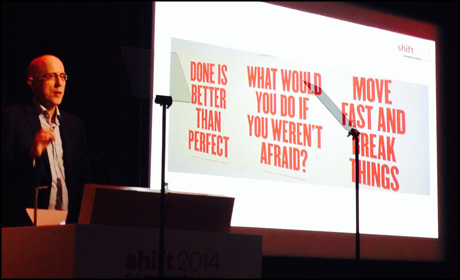
While news industry "pessimists" believe the sector is doomed, Telegraph Media Group's Jason Seiken believes the world is entering a "golden age" for consumers, journalists and advertisers.
Speaking at Newsworks' Shift 2014 conference in London today, Seiken – who is chief content officer and editor-in-chief at the outlet – detailed the opportunities he believes the digital revolution affords news brands, and how he hopes to lead the Telegraph to the front of the pack.
"The Telegraph in midst of a transformation," he said, "to being digitally-native in practice as well as theory.
"That starts with putting the audience at the centre of everything."
To do that, a publication needs to be constantly interacting with the audience to explore "what they want, when they want it and how they're using it", he said, and the wealth of analytics tools available helps publishers understand their audience better.If you aren't using data to listen to your customers, your competitors areJason Seiken, Telegraph Media Group
"If you aren't using data to listen to your customers, your competitors are," he said.
In the past, Seiken said, the "editor was king" in deciding the nature of a publication. However, the ability to understand the audience on a more detailed level and the much broader availability of formats, platforms, tools and technologies means this is not how Seiken envisions the future.
Reeling off a lengthy list of topics involved in digital publishing – including video, audio, print, interactives, social, search engine optimisation (SEO), analytics, infographics, advertising and programming – he illustrated the range of expertise necessary in a modern, digital news brand.

Jason Seiken speaking at Newsworks' Shift 2014 conference
"The choices are too broad and too complex," he said, "and the expertise required in each discipline is too deep" to have one person understand everything in the "top down control" of the past.
Instead, he suggested a publications culture should be about "empowering journalists and holding them accountable to the results".
"The editor needs to set the vision and then hire world class experts across a broad range of disciplines," he said, "and create an environment for them to do their best work."
A culture that is "comfortable with small failures" is the key to innovation, he said, as the Telegraph looks to explore new technologies for telling the news.
Inviting up to the stage his "first hire", visual journalist and innovation specialist Lewis Whyld, Seiken explained how the Telegraph is already experimenting with drones, Google Glass and the Oculus Rift augmented reality goggles.Drone demonstration from @lewiswhyld at #shift2014 https://t.co/mSCtwl1YFr
— Alastair Reid (@AlastairReid3) April 10, 2014
"Changing an iconic institution is no cakewalk but I know it can be done because I've done it before," he said, citing his work at PBS.
It is not an impossible project, he said, and at the Telegraph he will begin this change by instilling two key ideas.
Firstly, that the most valuable asset of any news organisation is its brand principles, which at The Telegraph are "integrity, honesty, reliability and trust," Seiken said.
"These are immutable and non-negotiable."
The second, equally important point, was to create a culture where the "only commandments chiselled in stone will be those core values".
"Everything else is open to experimentation and change," he said, "as we disrupt ourselves into the new golden age."
Free daily newsletter
If you like our news and feature articles, you can sign up to receive our free daily (Mon-Fri) email newsletter (mobile friendly).









